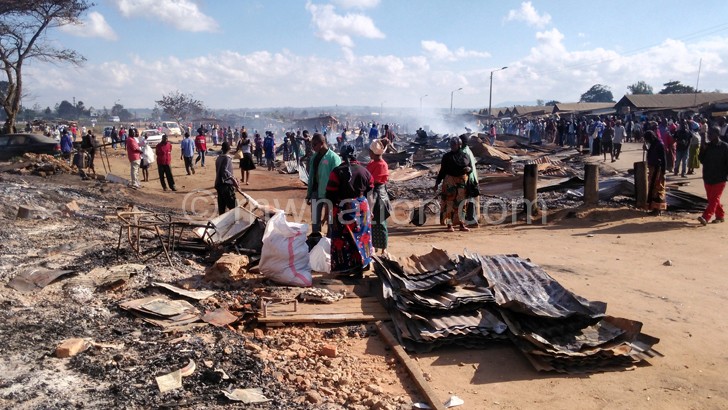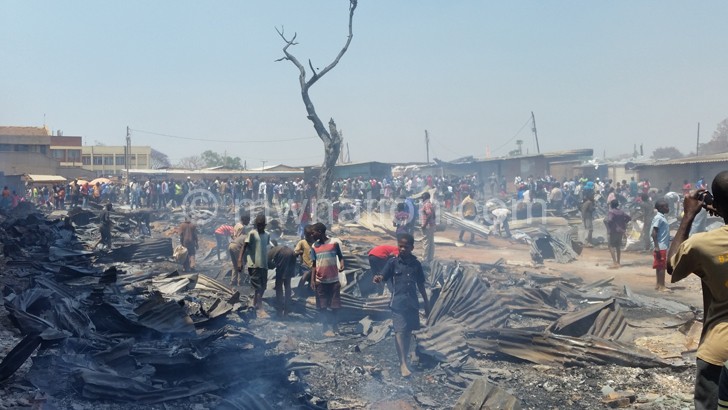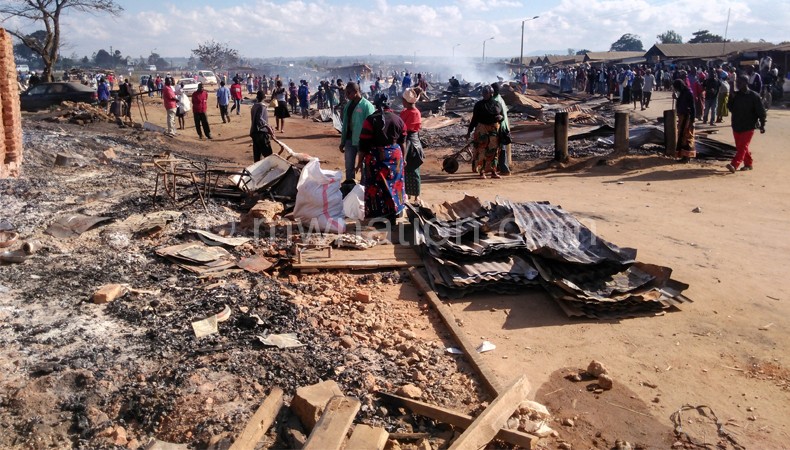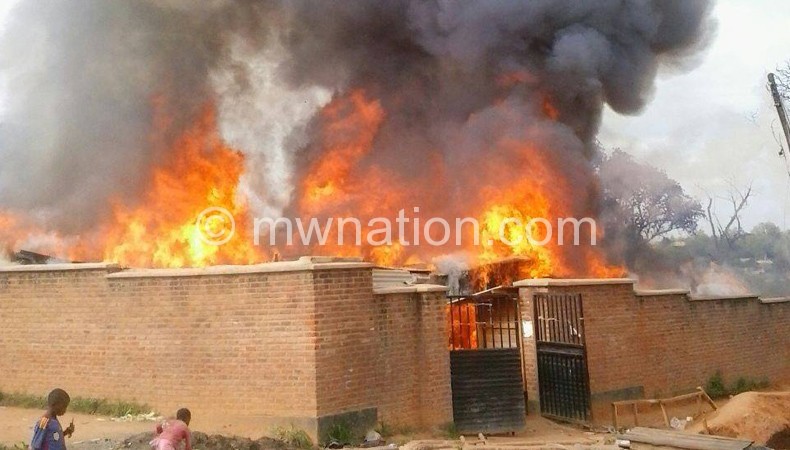The long and short of market fires
It has become a clichè for Malawians to talk about market fires, but the repeated tragedies in Mzuzu and other parts of the country call for renewed workmanship to safeguard the business community and their prized goods. Mzuzu Bureau Supervisor JAMES CHAVULA writes.
Market fires do not gut shops. They char livelihoods. This is why Tabita Zakeyo wants a lasting solution to the spate of fires that keep disrupting the way people do business in the country. The woman, whose husband died in a car crash in May this year, is one of thousands of traders affected by a fierce fire which consumed part of Mzuzu Central Market last Wednesday.

“Unless we get to the bottom of this tragedy, it will continue making people poor,” the widow said after hopelessly watching her shop go up in smoke when fire destroyed Mzuzu Central Market for the third time since April 2014.
When we met, she was sitting on the rubble of her shop, counting her losses. Ash, smouldering charcoal, sooty remains of perfume bottles and other vestiges of her small-scale business said it all. A dying spiral of smoke from pieces of residual timber provided a tear-provoking epilogue to the tale of agony.
“Here lied a cosmetics shop that meant everything to us. Since my husband departed, I have been feeding our six children and paying school fees for two of them singlehandedly from the proceeds of this shop,” Zakeyo said.
She confessed to an avowed dream to keep the single most important piece of her inheritance alive at all cost and salutes her husband, who was on a business trip to South Africa when tragedy struck, for teaching her how to make money and how to surmount drawbacks on the trade routes to neighbouring countries where they used to order their goods.
To keep her dream alive and replenish the shelves, she has been making long travels to Tanzania and South Africa—importing cosmetics, toys, necklaces, earrings, hair pins, bangles and other adornments. Zakeyo hopes no more and she looks forward to tough times ahead.

“It was around 9pm when I heard the market was on fire. I rushed there, but it was too late. I wanted to save the shop, but the flames were merciless. Nobody saved anything worthwhile. Venturing into the fierce fire would have been suicidal,” she recounted.
Back to zero
So massive was the inferno that it leapt from the makeshift shops made of fire-prone materials to upper floors of two double-storey buildings where it displaced six families and destroyed merchandise worth millions of kwacha in the process. Like many affected vendors, the businessperson pointed to a dead end due to lack of insurance and savings for reconstruction.
“We are back to square zero,” said Mzuzu Vendors Committee chairperson Emmanuel Munthali, who has witnessed similar catastrophes three times since last year.
The traders want government and the local authorities to get rid of structures fashioned of cartons, wood products, plastics and other fire-susceptible materials.
Instead, Munthali and his followers want the “ticking time bombs” replaced with brick-and-cement structures with iron-sheet roofs. But this is not a new call

When fire gutted the market, annihilating goods worth K110 million in April last year, the consensus was already loud and clear. The city council promised to finally replace the shacks with the fire-resistant buildings.
Nothing happened. The cry for resilient markets was not getting lower three months later when a worse tragedy struck, reducing to ashes goods estimated at K283 million. The vendors took the law into their hands to set up the brick-and-mortar shops they had been denied.
In the wake of the newest fire, Munthali revealed: “We have been lobbying the council for a better market for years.”

Conspiracy?
Minister of Local Government and Rural Development Kondwani Nankhumwa describes the Mzuzu scenario as painful, cruel and as criminal as murder.
“It’s hard to understand why the market is being subjected to this tragedy. Without conclusively pointing a finger at anyone, let me warn that if there is someone sabotaging the market then this time around the long arm of the law will catch up with them soon,” he warns. He is not alone in conjuring up conspiracy theories.
Also suspecting foul play is Minister of Information, Tourism and Civic Education Jappi Mhango. But the main losers—the vendors—seem sick and tired of the talk show. They want the tragic mystery solved once and for all.
They may never get to know the real cause of fire, but nearly all of them seem to agree with Munthali that theirs is no natural tragedy.
“We usually blame electrical faults or unattended mbaula [charcoal burners], but there were no electrical installations and restaurants on the worst area,” the vendors’ leader says. The traders suspect the fire was first sighted in a shop that stocks sacks.
However, the suspicion is spreading along with two conspiracy theories. First, a feeling is gaining sway that when the going gets tough, some ill-minded traders resort to burning markets as a way to ask banks, microfinance institutions and other credit organisations for debt relief or extended repayment duration.
The burning issue
As the wait for the incredible figures continues, a counterview is lingering that the council and its associates need not look far for answers. For this school of thought, Mzuzu, just like most markets nationwide, has long been an accident waiting to happen. They argue the affected spot offered students of town planning limitless lessons about nearly everything not to do when designing resilient cities and marketplaces.
In the beginning, the setting crammed with shacks that went up in smoke was set aside as a car park for the central market. The brains at the city council did not just sit aside and watch as the vendors encroached and fashioned their structures with materials that fuel fire.
Dos and don’ts
When disaster struck, the messy structures acted as one vast bridge for the escalating flames as they leapt from the overcrowded spot to the upper deck of the high-rise business premises where firefighters struggled in vain to put out the inferno.
“Frequent fires and failure to save invaluable property on time erode investors trust and interest in the city,” one of the affected investors said.
During a visit to the hugely devastated Chambo Building, business had come to a standstill on the ground floors which was almost unscathed by the fire. Sun Bin Enterprise remained padlocked for days while some Chinese nationals were seen hauling away goods Jian Fen Supermarket in readiness for its closure.
In the neighbouring Ayesha building, where shops belonging to General Insurance, Bible Society of Malawi, Lords Best Collection, Azim and other enterprises were consumed, workers were seen clearing the mess amid fears of job insecurity.
As the city supremos return to the drawing board to plot the way back to sanity, Zakeyo and other concerned vendors want them to put markets in order to safeguard lives and goods from avoidable losses.





